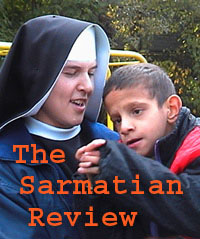| This Issue | Back Issues | Editorial Board | Contact Information |

From the Editor
January 2004
Volume XXIV, No. 1
Christina Manetti's article demonstrates that Polish discourse has come of age: it has become capable of criticizing itself. Specifically, it has begun to note that the self-congratulatory attitudes which some World War II survivors assumed were not entirely justified. The reference here is to such stories as Jan Józef Szczepanski's "Boots" published in Tygodnik Powszechny in 1947. At that time Polish discourse began to note that victims could also be perpetrators while remaining victims; that survivors can be perpetrators. Of course the timing of "Boots" was wrong: the story was published at a time when far more significant crimes were being committed on Polish soil by the Soviet occupiers and their collaborators--some of whom had been, again, victims.
The ability to make these fine distinctions is a sign of a discourse coming of age. It is significant that in Poland, this coming of age occurred in a Catholic weekly, however restricted its Catholic capabilities were by the Soviet occupiers.
Kevin Hannan's essay on Polish Catholicism is remarkable for several reasons. First, it is written by a Texan rather than a Varsovian or a Cracovian. Second, it incorporates Dr. Hannan's knowledge of several Slavic cultures and several branches of Christianity. Third, it contains some unique insights, such as that of the largely suppressed story of how the Council of Florence and its decrees were initially accepted in Muscovite Russia, and then rejected owing to the tsars' desire for power.
Among the reviewers we again welcome Dr. Danusha Goska, a talented academic from Indiana who has written her second review for us. John Guzlowski's review of Kenneth Maillard's book argues that Clarinet Polka practices a subtle one-upmanship (called Orientalism by Edward Said) with regard to Polish Americans. This is done without ever mentioning the name of Edward Said or touching on his methodology: a feat that surely deserves praise.
We need to correct information given by the translator of Gustav Herling's (a.k.a. Gustaw Herling-Grudzinski's) The Noonday Cemetery: Herling was not the founder of the Paris monthly Kultura; Jerzy Giedroyc was. Herling was one of Kultura's collaborators, and he published there often until he and Giedroyc parted ways due to disagreements on policy.
We also would like to acknowledge the long-term project in which Professor Michael Mikos has engaged: that of providing a multi-volume compendium to the study of Polish literature in the Anglophone areas of the world. The volume under review deals with Romanticism. Professor Andrzej Karcz gives it a sensitive reading. Two more volumes will be published, thus bringing a to a closure Professor Mikos's large project.
Back to the January 2004 Issue
The Sarmatian Review
sarmatia@rice.edu
Last updated 1/25/04